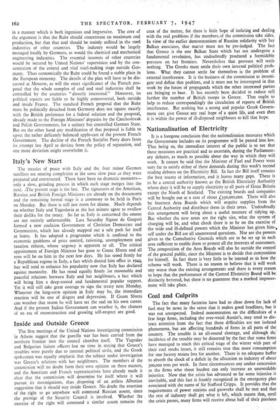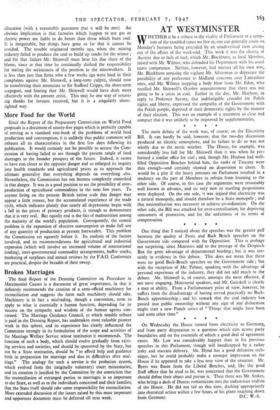Coal and Culprits - The fact that many factories have
had to close down for lack of fuel may be news in the sense that it makes good headlines, but it was not unexpected. Indeed concentration on the difficulties of a few large firms, including the ever-vocal Austin's, may tend to dis- tract attention from the fact that those difficulties are not isolated phenomena, but are affecting hundreds of firms in all parts of the country. The trouble is an all-round shortage, and although thf- incidence of the trouble may be distorted by the fact that some firms have managed to reach this critical stage of the winter with part of their coal stocks intact, it still remains true that more consumption for one factory means less for another. There is no, adequate buffer to absorb the shock of a deficit in the allocation to industry of about 300,000 tons per week. In these circumstances any undue concession to the firms who shout loudest can only increase an unavoidable injustice. Now that the crisis has advanced so far some injustice is inevitable, and this fact is frankly recognised in the emergency plan associated with the name of Sir Stafford Cripps. It provides that the requirements of power stations and. gasworks shall be met and that the rest of industry shall get what is left,, which means that,, until the crisis passes, many firms will receive about half of their previous
allocation (with a reasonable guarantee that it will be met). An obvious implication is that factories which happen to use gas or electric power are liable to do better than those which burn coal. It is inequitable, but things have gone so far that it cannot be avoided. The trouble originated months ago, when the mining industry failed to produce the coal to build up stocks for the winter ; and for that failure Mr. Shinwell must bear his due share of the blame, since at that time he continually shirked the responsibility for stating the seriousness of the position to the mineworkers. It is less than just that firms who a few weeks ago were loud in their complaints against Mr. Shinwell, a long-term culprit, should now be transferring their attentions to Sir Stafford Cripps, the short-term scapegoat, and hinting that Mr. Shinwell would have dealt more effectively with the present crisis. This may be one way of return- ing thanks for favours received, but it is a singularly short- sighted way.



































 Previous page
Previous page